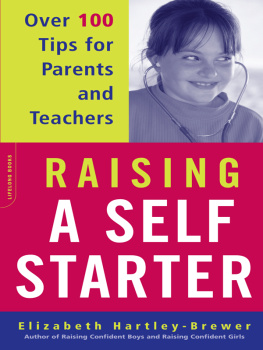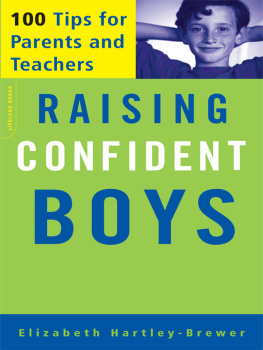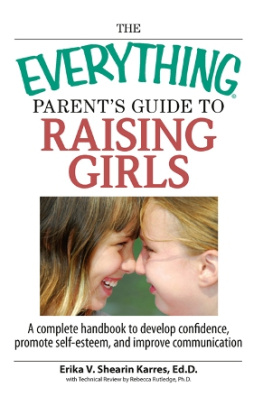

DEDICATION
For Georgia and her life-long friends Miranda, Avani, Lizzie and Jessica, with whom she has shared so much for so long
Many of the designations used by manufacturers and sellers to distinguish their products are claimed as trademarks. Where those designations appear in this book and Fisher Books was aware of a trademark claim, the designations have been printed in initial capital letters.
North American edition 2001 Da Capo Press
Text copyright 2000 by Elizabeth Hartley-Brewer
First published in the United Kingdom in 2000 by Vermilion, an imprint of Ebury Press
All rights reserved. No part of this publication may be reproduced, stored in a retrieval system, or transmitted, in any form or by any means, electronic, mechanical, photocopying, recording, or otherwise, without the prior written permission of the publisher.
Cataloging-in-Publication data for this book is available from the Library of Congress.
ISBN 978-0-7867-2421-5 (e-book)
Da Capo Press is a member of the Perseus Books Group.
Find us on the World Wide Web at http://www.dacpopress.com
Da Capo Press titles are available at special discounts for bulk purchases in the U.S. by corporations, institutions, and other organizations. For more information, please contact the Special Markets Department at the Perseus Books Group, 2300 Chestnut Street, Suite 200, Philadelphia, PA, 19103, or call (800) 810-4145, ext. 5000, or email .
First printing, March 2001
21 22 23 24 25 09 08 07 06
Contents
The idea for this book and its partner, Raising Confident Boys, came from my editor, Jacqueline Burns. Had she not been such fun to work with, I may not have gone ahead with it. So Id like to thank her, and Amy Corzine, who took over the reins during Jacquelines maternity leave.
I am indebted to two teacher friends in particular, Dexter Hutt, Principal of Ninestiles School, and Gary Wilson, Head of English at Newsome High, who both gave precious time to long conversations and manuscript reading, which I needed and really appreciate. I would also like to thank Geoff Evans, of the Cmon Everybody project; Adrienne Katz, of the research organization Young Voice, which published The Can-Do Girls; Jo Adams, for her report GirlPower; and Alex Vear, a good, wise friend and mother of two daughters in the thick of growing up, for helping in various ways.
Finally, Id like to thank my daughter, Georgia, who is just entering adolescence, for her constant support, love, and understanding. I wish her well for the adventure ahead.

Everything seems to be going right for girls. Their confidence, exam results and career opportunities are rising. Released from the prison of domestic life, they have a freedom that was unheard of fifty years ago. Many boys feel that girls have it easy and resent it, for the have-it-all world that beckoned their mothers seems like a go-and-get-it-all world to their daughters, and leaves boys behind.
Competent, successful superwomen have bred competent, successful supergirlsor have they? Not far under the surface of girl power lie new pressures and insecurities that come with our daughters enhanced potential for success. Some, such as eating disorders, have arrived in the slipstream of that success. Others exist where success is absent, for success has certainly not come to all girls, who today manage a triple dose of expectation: to be academically and economically successful; to be emotionally independent and to achieve the heightened standard of beauty that cosmetics, clothes and even surgery can now provide. They are expected to look good for themselves and their female friends, not necessarily for the opposite sex, who are regarded as creating more problems than they are worth, hence the new female goal of emotional as well as economic independence. Alongside this emotional aloofness is an equally pervasive pressure for girls to be not only sexually aware but also sexually skillful. The magazines tell them how. It is an emotional minefield in which many vulnerable girls get blown up, as teenage pregnancy figures testify.
There are academic casualties, too. While many girls work the educational system to their advantage, some succeed only at considerable cost to their mental health and well-being. Others fail to make it at all. Two to three girls in every one hundred will attempt suicide at some time in their teenage years. Indeed, females between fifteen and nineteen are the highest single risk group for attempted suicide.
Some parents add to the pressures their daughters feel. Like them, they fall prey to the look-good, feel-good, get-rich-quick society. Mothers can look more stunning than their ugly duckling daughters for years, and they must be self-assured enough not to play this game.
The brighter side of the story is that at the beginning of the twenty-first century, females have more opportunities and are less restricted by their gender than ever before. There are few areas of sport, leisure or work that remain the exclusive preserve of males, in theory at least. Girls can have all this and also become mothers.
With so much available to girls, parents and teachers have the task of helping them make the most of their abilities. However, to maximize their chances and to protect themselves against the potential problems of their new position in society, girls need plenty of positive self-esteem and large doses of genuine self-assurance.
Girls must fashion a new femininityone that will encourage integrity, respect for others and themselves, independence and autonomy while acknowledging their biological inclination to nurture. Femininity used to imply making oneself look pretty for men, being self-effacing, submissive, compliant and placid, always thinking of and caring for someone elses needs before addressing ones own. This is now rejected by most young women, but, in pushing themselves forward, some have simply imitated men.
A respectful regard for themselves as female is vital if they are to remain psychologically intact in the face of the abuse that so many suffer. They should not consider themselves weak or inferior to boys because they may be more emotional or dont always feel in control. Girls must acknowledge their own needs while recognizing other peoples, see themselves as having worthwhile views and accept that they deserve care and respect from others.
The self-criticism, low self-esteem and dissatisfaction with their looks and performance that exist unexpressed behind even confident exteriors should be a matter of considerable concern. Girls thrive when people notice when theyve done something well, listen to and take them seriously, and acknowledge their rights.
If girls are to become more self-assured, parents and other involved adults cannot start too soon. Building self-knowledge, identity, confidence and self-esteemthe constituents of inner strengthis the way to create a resilient young woman who is able to cope with challenges and an uncertain future with confidence.

Girls fundamental needs are the same as boys. No one has an awareness of their gender until about the age of two, and most of us go on needing the same kind of essential support and care from those close to us throughout our adult lives. In addition to being fed and clothed appropriately and kept clean and healthy, young girls, like boys, also need emotional sustenance. They need to be loved and cherished, appreciated and valued, noticed, enjoyed and admired.
Next page












